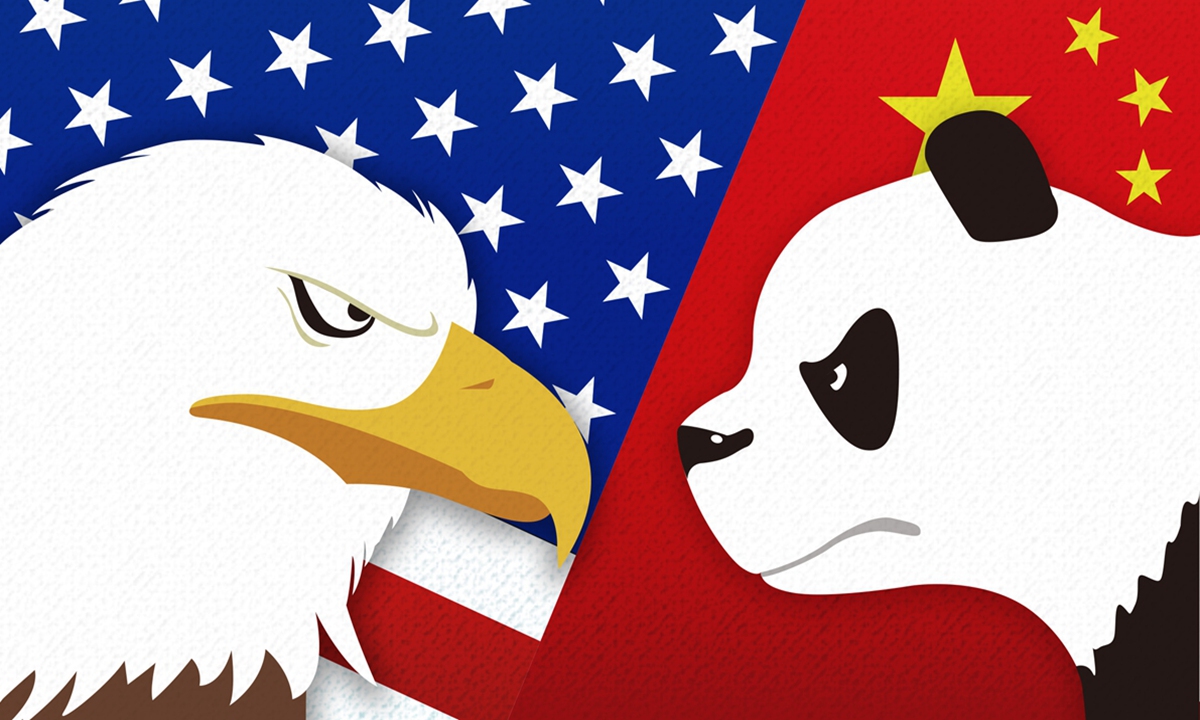
Illustration: Liu Rui/GT
US Deputy Secretary of State Wendy Sherman was scheduled to visit North China's Tianjin from Sunday to Monday. Vice Foreign Minister Xie Feng, who is in charge of China-US relations at the Chinese Foreign Ministry, would hold talks with the US official. Later, Chinese State Councilor and Foreign Minister Wang Yi would meet Sherman, according to a statement from the Chinese Foreign Ministry.
During the China-US high-level strategic dialogue held in Anchorage, Alaska in March, China expressed its strong dissatisfaction with US' provocations, and struck back.. Compared with the Alaska talks, the atmosphere for the Tianjin talks will not improve much during Sherman's visit. In fact, it may be even worse.
For example, US State Department spokesperson Ned Price said on Wednesday that Sherman would travel to China "from a position of strength." During a press conference on Friday, Chinese Foreign Ministry spokesperson Zhao Lijian refuted such arrogance and hegemony: "We didn't buy that in Anchorage, and we certainly won't buy that in Tianjin."
Since the Alaska talks, Washington has done many things to provoke Beijing, from interfering in China's internal affairs to sending military aircraft to the island of Taiwan. The US regards itself as the only superpower worldwide, implementing its policies from the so-called position of strength. Washington is still walking on the wrong path, handling ties with Beijing in an irresponsible manner. The atmosphere of the two sides' dialogue has become even worse now. Both China and the US may have very low expectations for the outcomes of Sherman's visit.
Wang said on Saturday that if the US has not learned to treat other countries equally, China and the international community have the obligation to help the US make up for this lesson. This reflects China's firm position. It is not a one-time act to "help the US make up for this lesson," but a process. All other countries must adhere to the basic norms of international relations, including national independence and sovereign equality. Washington can only "make up for this lesson" when it finds that its arrogant attitude suddenly faces setbacks everywhere.
Sherman is going to make clear that "we welcome stiff and sustained competition" with China but she will also "underscore that we do not want that stiff and sustained competition to veer into conflict," an anonymous senior US official told reporters during a background briefing on Saturday. However, Washington has continued to send signals that it will challenge China's core interests. This means the US is taking the initiative to provoke conflict.
In fact, the so-called stiff and sustained competition is not a normal state between China and the US. Since the founding of the People's Republic of China in1949, China's achievements have never been the result of "stiff and sustained competition." Cooperation between China and the US is the best approach. But if the US must engage in such a competition, China has no other option but to fight back.
Beijing and Washington should at least set common rules if they do not want a direct confrontation. For example, should sovereign equality be the common rule? Should the principle of noninterference in each other's internal affairs be adopted as a rule? If Washington cannot even establish common rules to manage the "stiff and sustained competition," it will be hard to avoid a downward spiral in China-US relations, or even direct confrontation.
Some analysts say that China has started to decide its attitude toward the US based on facts, rather than on the overall situation of China-US relations. Before Sherman's visit to Tianjin, China used its newly enacted Anti-Foreign Sanctions Law for the first time to impose reciprocal sanctions on six US individuals and one entity, including former US secretary of commerce Wilbur Louis Ross. China seems to have no worries that this may affect the atmosphere of the Tianjin talks during Sherman's visit.
China is sending a signal to the US. In fact, Washington has actively taken many actions to destroy the atmosphere before Sherman's visit. For instance, it has stepped up its efforts to accuse China of masterminding cyber attacks worldwide, and has sent military aircraft to land on the island of Taiwan. Facing such undisguised provocations, China surely must strike back with countermeasures that are beyond reproach. The US needs to make a reflection: Will its provocative actions do any good to the rectification of bilateral relations?
The US is a pragmatic country. It hopes to defeat China through competition. However, in view of the problems that it is unable to deal with alone, it also wants to seek cooperation with China. But its ultimate purpose is to defeat China. As such, China must firmly insist on two things. First, we must concentrate our efforts on managing our own things well. Only when China becomes increasingly stronger can the US realize the cost of colliding with China. By then, Washington will have to adjust its China policy to avoid greater damage to its own interests. Second, China must make as many friends as possible and strive to unite with all forces that can be united with.
The author is a senior research fellow at the China Institute of International Studies. opinion@globaltimes.com.cn




